

Cordon. A cordon is a line of people, military posts, or ships surrounding an area to close or guard it.
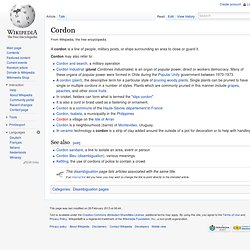
Cordon may also refer to: Juche. Juche (sometimes spelled Chuch'e; Chosŏn'gŭl: 주체; hancha: 主體; Korean pronunciation: [tɕutɕʰe]), literally "self-reliance", sometimes referred to as Kimilsungism or Kimilsungism–Kimjongilism, is a political thesis formed by the former North Korean leader Kim Il-sung which states that the Korean masses are the masters of the country's development.
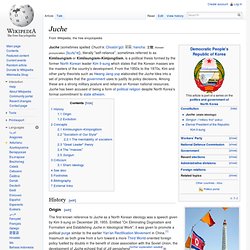
From the 1950s to the 1970s, Kim and other party theorists such as Hwang Jang-yop elaborated the Juche Idea into a set of principles that the government uses to justify its policy decisions. Among these are a strong military posture and reliance on Korean national resources. Juche has been accused of being a form of political religion despite North Korea's formal commitment to state atheism. History[edit] Origin[edit] The first known reference to Juche as a North Korean ideology was a speech given by Kim Il-sung on December 28, 1955.
Evolution[edit] In his 1955 speech, the first known to refer to Juche, Kim Il-sung stated:[8]:421:422. Cultural Revolution. The Great Proletarian Cultural Revolution, commonly known as the Cultural Revolution, was a social-political movement that took place in the People's Republic of China from 1966.
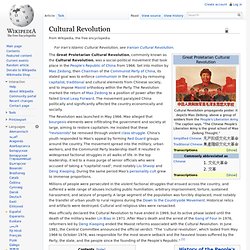
Set into motion by Mao Zedong, then Chairman of the Communist Party of China, its stated goal was to enforce communism in the country by removing capitalist, traditional and cultural elements from Chinese society, and to impose Maoist orthodoxy within the Party. Bourgeois liberalism. Bourgeois liberalism (simplified Chinese: 资产阶级自由主义 zh; traditional Chinese: 資產階級自由主義; pinyin: zīchăn jiējí zìyóu zhŭyì) refers to either parliamentary democracy or Western popular culture.
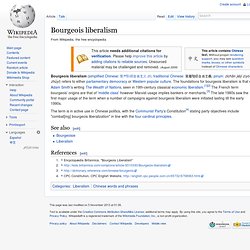
The foundations for bourgeois liberalism is that of Adam Smith's writing The Wealth of Nations, seen in 19th-century classical economic liberalism.[1][2] The French term bourgeois' origins are that of 'middle class' however Marxist usage implies bankers or merchants.[3] The late 1980s saw the first major usage of the term when a number of campaigns against bourgeois liberalism were initiated lasting till the early 1990s. The term is in active use in Chinese politics, with the Communist Party's Constitution[4] stating party objectives include "combat[ing] bourgeois liberalization" in line with the four cardinal principles. Achieve - Lyndon LaRouche. Background[edit] Early life[edit] University studies, Marxism, marriage[edit]
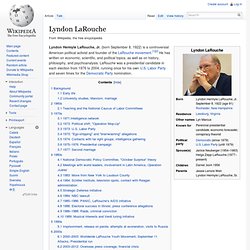
Dual-track system. A dual-track system is an economic system in which the government controls key sectors of the economy, while allowing private enterprise limited control over the other sectors.[1] Chinese Economic Reform Jump up ^ 1981: Dual-track Price System -- China.org.cn.
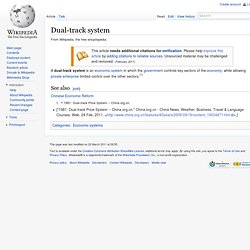
["1981: Dual-track Price System -- China.org.cn. " China.org.cn - China News, Weather, Business, Travel & Language Courses. Web. 24 Feb. 2011. Single-party state. A single-party state, one-party state, one-party system or single-party system is a type of state in which a single political party has the right to form the government, usually based on the existing constitution.
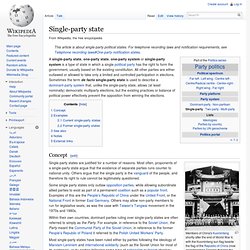
All other parties are either outlawed or allowed to take only a limited and controlled participation in elections. Deng Xiaoping. Deng Xiaoping (Pinyin: Dèng Xiǎopíng, [tɤŋ˥˩ ɕjɑʊ˩ pʰiŋ˧˥] ( ); 22 August 1904 – 19 February 1997) was a politician and reformist leader of the People's Republic of China who, after Mao's death led his country towards a market economy.
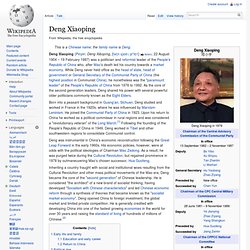
While Deng never held office as the head of state, head of government or General Secretary of the Communist Party of China (the highest position in Communist China), he nonetheless was the "paramount leader" of the People's Republic of China from 1978 to 1992. As the core of the second generation leaders, Deng shared his power with several powerful older politicians commonly known as the Eight Elders. Born into a peasant background in Guang'an, Sichuan, Deng studied and worked in France in the 1920s, where he was influenced by Marxism-Leninism. Tiananmen Square protests of 1989. The Chinese government condemned the protests as a "counter-revolutionary riot", and has prohibited all forms of discussion or remembrance of the events since.[6][7] Due to the lack of information from China, many aspects of the events remain unknown or unconfirmed.
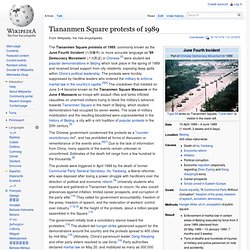
Estimates of the death toll range from a few hundred to the thousands.[8] The protests were triggered in April 1989 by the death of former Communist Party General Secretary, Hu Yaobang, a liberal reformer, who was deposed after losing a power struggle with hardliners over the direction of political and economic reform.[9] University students who marched and gathered in Tiananmen Square to mourn. Mao Zedong. Mao Zedong, also transcribed as Mao Tse-tung listen , and commonly referred to as Chairman Mao (December 26, 1893 – September 9, 1976), was a Chinese Communist revolutionary and the founding father of the People's Republic of China, which he governed as Chairman of the Communist Party of China from its establishment in 1949 until his death.
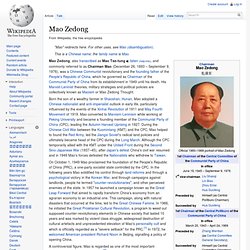
His Marxist-Leninist theories, military strategies and political policies are collectively known as Maoism or Mao Zedong Thought. Market economy. Market economies can range from hypothetical laissez-faire and free market variants to regulated markets and interventionist variants. In reality market economies do not exist in pure form, since societies and governments regulate them to varying degrees.[4][5] Most existing market economies include a degree of economic planning or state-directed activity, and are thus classified as mixed economies. The term free-market economy is sometimes used synonymously with market economy, but it may also refer to laissez-faire or Free-market anarchism.[6] Capitalism[edit] Capitalism generally refers to economic system where the means of production are largely or entirely privately owned and operated for a profit, structured on the process of capital accumulation.
In general, investments, distribution, income, and prices are determined by markets. Mass line. According to Frederick Teiwes, Emeritus Professor at the University of Sydney, the "mass line" was related to the CCP's mass organizations. "Fundamentally, for all the CCP rhetoric concerning the 'mass line,' the unions and other mass organizations functioned more as Stalinist "transmission belts" in laying down the party line and extending the reach of the state," he wrote.[3] History[edit] After recognizing that large numbers of cadres properly trained in mass line tactics were critically needed for the CCP's building of a "complete socialist order," it intensified its cadre training program in 1950-1951 to ensure that all cadres and other workers would be "carefully indoctrinated in basic Marxist-Leninist mass line theory and practice.
Four Modernizations. The Four Modernizations were goals first set forth by Zhou Enlai in 1963, and enacted by Deng Xiaoping from 1978, to strengthen the fields of agriculture, industry, national defense, and science and technology in China.[1] The Four Modernizations were adopted as a means of rejuvenating China's economy in 1978 following the death of Mao Zedong, and were among the defining features of Deng Xiaoping's tenure as head of the party. Summary[edit] They were introduced as early as January 1963: at the Conference on Scientific and Technological Work held in Shanghai that month, Zhou Enlai called for professionals in the sciences to realize "the Four Modernizations. The science and technology modernization although understood by Chinese leaders as being key to the transformation of industry and the economy, proved to be more of a theoretical goal versus an achievable objective.
Left communism. Deng Xiaoping Theory. Iron rice bowl. "Iron rice bowl" (simplified Chinese: 铁饭碗; traditional Chinese: 鐵飯碗; pinyin: tiě fàn wǎn) is a Chinese term used to refer to an occupation with guaranteed job security, as well as steady income and benefits.[1] The Chinese term can be compared to the similar (but not identical) English concept of a breadwinner with cradle to grave socialism. Traditionally, people considered to have iron rice bowls include military personnel, members of the civil service, as well as employees of various state run enterprises (through the mechanism of the work unit).[2] Recent moves at cutting benefits and privatization of various state run businesses in Taiwan such as the Taiwan Railway Administration and China Airlines have led many in those industries to believe that their iron rice bowls are in jeopardy, and has led to strikes (and threats thereof), as well as being the subject of much political debate.
Trotskyism. Marxism–Leninism. Socialism in One Country. Socialism in One Country was a theory put forth by Joseph Stalin in 1924, elaborated by Nikolai Bukharin in 1925 and finally adopted by the Soviet Union as state policy. First Five-Year Plan (Soviet Union) Autarchism. Autarchism (from Greek, "belief in self rule") is a political philosophy that upholds the principle of individual liberty, rejects compulsory government, and supports the elimination of government in favor of ruling oneself and no other. Autarky. Revisionism (Marxism) Within the Marxist movement, the word revisionism is used to refer to various ideas, principles and theories that are based on a significant revision of fundamental Marxist premises.[1] The term is most often used by those Marxists who believe that such revisions are unwarranted and represent a "watering down" or abandonment of Marxism.
As such, revisionism often carries pejorative connotations. Great Leap Forward. Leninism. The Russian revolutionary Lenin (Vladimir Ilyich Ulyanov) c. 1920. Kulak. Kulaks (Russian: кула́к, tr. kulak, IPA: [kʊˈlak] ( ); "fist", by extension "tight-fisted"; kurkuls in Ukraine, also used in Russian texts in Ukrainian contexts) were a category of relatively affluent farmers in the later Russian Empire, Soviet Russia, and early Soviet Union. Dictatorship of the proletariat. Maoism. Stalinism. Six-party talks. Juche. People's Republic of China. Achieve - Trotskyism. Sino–Soviet split. Communist Party of China.